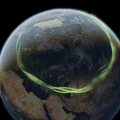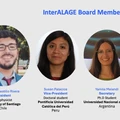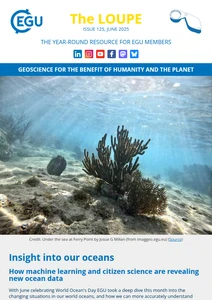President: Alexis Rouillard
(Emailst@egu.eu)
Deputy President: Emilia Kilpua
(Email)
ECS Representative: Andreas Wagner
(Emailecs-st@egu.eu)
The Division on Solar-Terrestrial Sciences (ST) considers all aspects of solar and heliospheric physics, specifically the solar-terrestrial connection. It covers the physical processes occurring on the Sun, in the solar wind, as well as in Earth's magnetosphere and ionosphere. Solar activity (e.g. coronal mass ejections, solar flares, solar energetic particle events) and the response of the near-Earth space environment to these solar phenomena are studied on a wide-range of temporal and spatial scales. Data analysis and interpretation of space-borne and ground-based data, as well as theoretical studies and different modelling techniques are used to better our understanding of how our local star defines the neighbourhood that we live in.
Latest posts from the ST blog

Chasing Auroras 41 Millennia Ago with Agnit Mukhopadhyay and Sanja Panovska
Approximately 41,000 years ago, during the Laschamps geomagnetic excursion, Earth’s magnetic field experienced a significant disturbance. The strength of the magnetic field decreased to only 10% of what it is today, the magnetic poles shifted considerably from the geographic poles, and the magnetosphere—the protective layer surrounding our planet—became smaller and distorted in previously unvisualized ways. For the first time, a recent study by Agnit Mukhopadhyay, Sanja Panovska, and colleagues (2025) has reconstructed the global space environment during this period, revealing …
Read more

A Week to Remember: My EGU 2025 Experience
Vienna transformed into a buzzing hub of scientific exchange as the European Geosciences Union (EGU) General Assembly (GA) 2025 took place from 27 April to 2 May. Over 20,000 scientists from 120 countries gathered to share groundbreaking research across the Earth, planetary, and space sciences. Attending the GA for the first time as part of the Early Career Scientists (ECS) Team of the Solar-Terrestrial Sciences (ST) Division was inspiring and eye-opening. Here are some of my impressions from this exciting …
Read more


Meet the InterALAGE Board Members
We are excited to introduce the InterALAGE Team! and share their vision for the future of the organization! To get to know them better, our Media and Communications Officer conducted an in-depth interview with the new board members. In this engaging conversation, the board members share their personal backgrounds, journeys within InterALAGE, and goals during their term. 1. To start off, could you share a bit about your background and what you’re currently working on? Carlos Castillo Rivera – President …
Read more
Recent awardees

- 2025
- Julius Bartels Medal
The 2025 Julius Bartels Medal is awarded to
Richard Horne for outstanding work on understanding the acceleration and transport processes of charged particles in the inner magnetosphere, the formation of the radiation belts and their space weather effects.
Read more

- 2025
- Division Outstanding Early Career Scientist Award
The 2025 Division Outstanding Early Career Scientist Award is awarded to
Karin Dissauer for outstanding research in solar and extra-solar space weather research.
Read more

The 2024 Hannes Alfvén Medal is awarded to
Sandra Catherine Chapman for her pioneering work and leadership in advancing our understanding of space plasma physics in the solar system and beyond.
Read more

- 2024
- Division Outstanding Early Career Scientist Award
The 2024 Division Outstanding Early Career Scientist Award is awarded to
Erika Palmerio for outstanding research in analysing complex solar transients and their space weather effects.
Read more

- 2024
- Outstanding Student and PhD candidate Presentation (OSPP) Award
The 2024 Outstanding Student and PhD candidate Presentation (OSPP) Award is awarded to
Leonard Schulz Capabilities of the wave telescope for multi-scale spacecraft configurations using a Vlasiator simulation
Read more
Current issue of the EGU newsletter










